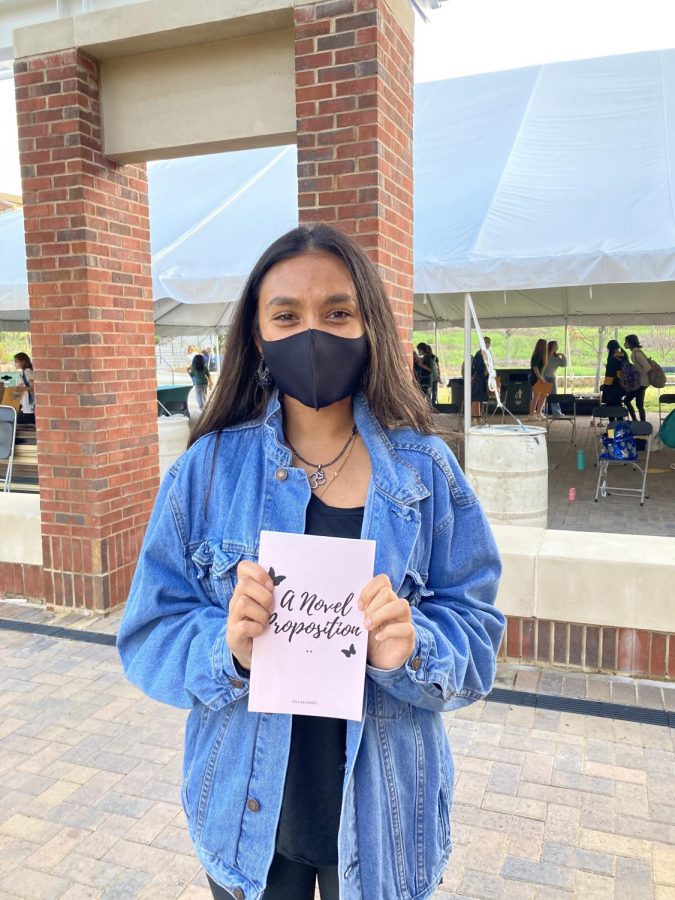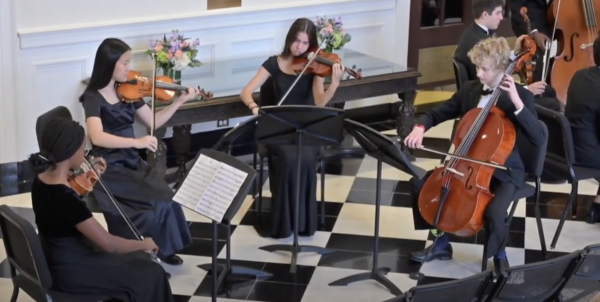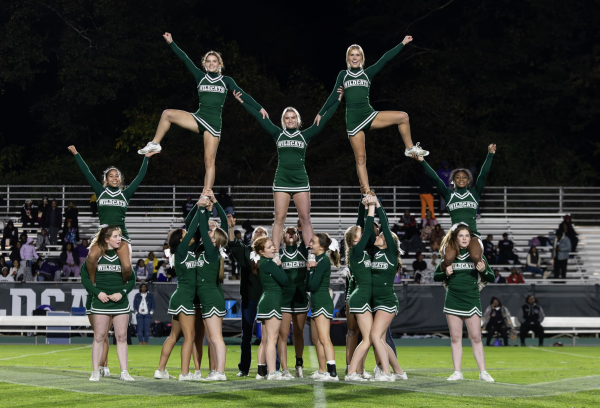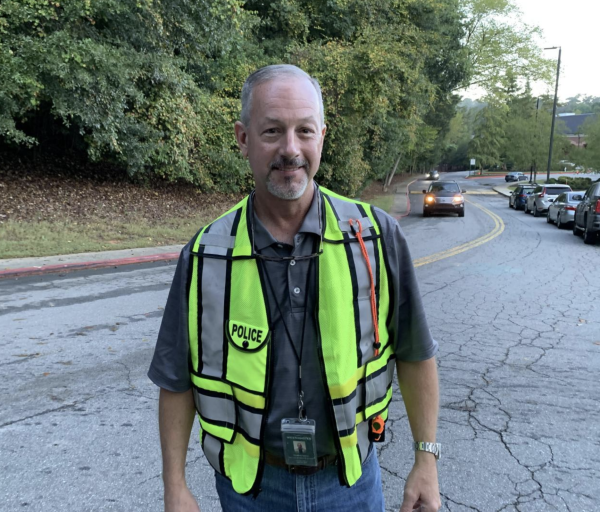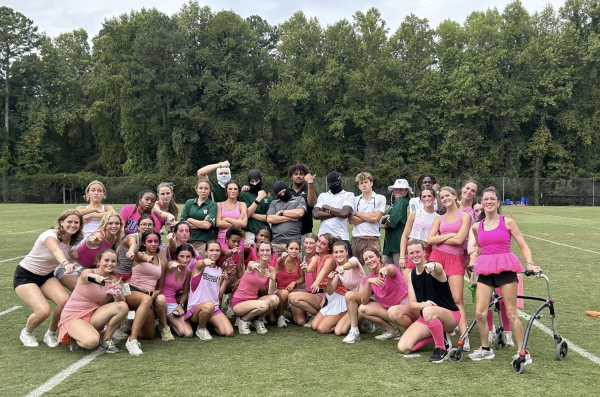Senior Riya Jayanthi publishes second collection of poetry
Photo credit Diane Chen
Riya Jayanthi, a senior at Westminster, holds her recently published book.
The ability to write poetry is a skill only a few possess, and even fewer can take pride in the accomplishment of being a published author. Despite her young age, senior Riya Jayanthi achieved this remarkable feat not only once, but twice. Less than a year after self-publishing her first collection of poetry, the truth behind youth, Jayanthi published her second book, a novel proposition. This book includes a collection of poetry, short prose, sketches, and photography. Jayanthi curated these books from a collection of her past and recent work, and both are available for purchase on Amazon.
Despite having the same resources to publish both of her books, Jayanthi feels that a novel proposition is dramatically different from the truth behind youth, both in tone and message.
“[The books] are different because they are opposite,” said Jayanthi. “I wasn’t in a great mindset writing [the truth behind youth], so a lot of the pieces surround my own struggles with mental health and these feelings of pretty intense inadequacy.”
For a novel proposition, Jayanthi said she selected the poems to express her growth and development, as well as to highlight her ability to overcome negativity.
“I wanted to show [the readers] that I escaped from the world in the truth behind youth,” said Jayanthi.
She displayed her emotional growth by including new artistic elements in her book. She then compiled her pieces into one document, from which she later selected the pieces for both of her books.
“A novel proposition has a lot of photography, sketches, drawings, references to Hawaii and Europe, super bright and beautiful places, and a lot of self-love,” said Jayanthi. “It is like a coming-of-age story, but more personal.”
Jayanthi started writing when she was about eight, but she did not discover her love for poetry until her freshman year. At the time, she started experimenting with flash fiction, only to find she didn’t like its structure.
“I just started messing with [flash fiction] and what came out was poetry,” said Jayanthi.
Like many other authors, Jayanthi finds inspiration everywhere, and she associates certain feelings, emotions, and experiences with places and music.
“To me, the truth behind youth was like a really dark Atlanta alleyway or something in D minor. Like a rainy day, but when it’s just sprinkling, and the sky is kind of cloudy,” said Jayanthi.
She added that a novel proposition is different in that it is happier and more confident, which is a departure from the darker tone of her first book.
“A novel proposition is very light, airy, and formal. Very bright and happy,” said Jayanthi.
With a novel proposition, however, Jayanthi says she is bringing into focus other topics beyond self-love and personal growth.
“It’s about growing up and learning to love yourself, but it also talks about the world and how we tear it apart and how we need to let it grow and be beautiful,” said Jayanthi. “It’s a collage of everything that means something to me.”
After selecting the poems for her second book and interspersing them with drawings, sketches, and photographs she took during her travels, Jayanthi decided to pursue self-publishing once more. She drew from the rewarding experience she had with her first book.
“Self-publishing is a great decision for me, and it means that I get to do all of the advertising and keep everything in my own hands. The copyright is mine. The ISBN is mine. That was really important to me because these two collections are effectively my life’s work,” said Jayanthi.
She added that reaching out to publishers in the past was a challenging experience and that she didn’t find the terms of a potential collaboration satisfactory.
“People were really kind of nasty in the publishing industry because I’m so young, so they just were not being cooperative,” said Jayanthi. “I didn’t feel comfortable giving the rights to my work.”
While Jayanthi worked on both books at the same time, a novel proposition required more attention to the formatting than the first, which delayed its release.
“The production process took about two years, which overlapped with my last release,” said Jayanthi.
Because her second book included much more than poetry, Jayanthi felt compelled to pay more attention to the formatting process to allow all of her entries to have a distinct voice.
“[Photographs and sketches] are also big parts of my life and craft, so I wanted to make sure that all of the aspects of the book had their individual opportunities to shine,” said Jayanthi.
Even though she is proud of both of her books, Jayanthi calls a novel proposition her favorite. According to Jayanthi, a novel proposition also received better reviews from the readers than the truth behind youth.
“I’m really proud of her, said senior Siya Kalra. “It’s her second book, and it’s really exciting. You feel like you’re reading her, like she is speaking to you through her writing. You see that this girl is not different in real life than she is in her writing.”
Jennifer Dracos-Tice, an Upper School English teacher, received Jayanthi’s manuscript as a gift, and she was impressed with her depth of perspective and artistic nimbleness.
“Her writing is unique,” said Dracos-Tice. “She is pushing beyond a singular 17-year-old’s perspective to ask the big questions. These are not just lovelorn poems of a teenage angst-ridden soul.”
Dracos-Tice believes that Jayanthi’s ability to cross over so many realms in her writing makes her unique. She also appreciates her authenticity and depth.
“Some of her poems are about relationships, which is great, but so many of them push out to consider what it means to really travel, to really experience a place, and not just move through it,” said Dracos-Tice..
She attributes Jayanthi’s success to her resilience and satisfaction with living in a state of imperfection.
“I really find her inspirational,” said Dracos-Tice. “She continues to generate work, and she gets up when she falls down. … Not only does she love to write, but she needs to write. She doesn’t give up, and she is persistent and resilient, and that is a lesson that is really hard to learn as a writer.”
